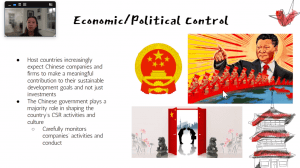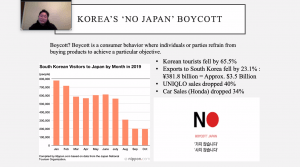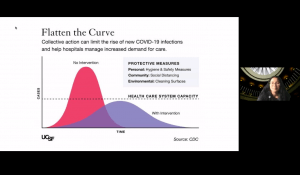The Center for Asia Pacific Studies is proud to share the accomplishments of the 2019-2020 cohort of Asia Bridge Junior Fellows. Throughout the course of the academic year, the fellows, mentored by Dr. Christopher Laurent (postdoctoral fellow at the center) joined the center’s community of students and scholars who share a common passion for Asia, engaging with Asia through their research and participating in events hosted by the center.
In the inaugural year of this merit-based undergraduate fellowship program, four junior fellows designed a research project of relevance for understanding the Asia Pacific region. Along the way, they gained skills in research, data analysis, essay and report writing, and public speaking. Throughout the year, the fellows participated in 9 research workshops, engaged in 6 Asia Pacific related community events, presented their work in a student-led online conference, and drafted a research paper on a topic they felt passionate about. The road to completing the fellowship was far from easy as the program had to adapt to the changing conditions of the pandemic. Fortunately, the students were able to rapidly transition to our online platform to fulfill the requirements for the program. This is no small feat as the center acknowledges students’ personal and shared struggles in this uncertain time.

Highlights from each junior fellow’s research project can be found below:
The Emergence of Corporate Social Responsibility Practices in China
Audrey Tran’s project entitled “The Emergence of Corporate Social Responsibility Practices in China” suggested that the future of Corporate Social Responsibility (CSR) might be in China. In her project, Audrey recognized the foundational role of Western companies in addressing consumers’ concerns. She dissected the role of social media and Confucianism that explain the rise of CSR in China and provided a hopeful picture of China becoming a CSR global leader in the future.

Ongoing History: The Korean Boycott of Japanese Goods
Yoogyeong Hwang’s project entitled “Ongoing History: The Korean Boycott of Japanese Goods” contextualized the emergence of a consumer movement in Korea. Tracing back tensions between both nations to the colonial period, Yoogyeong explained the means and the goals of the Korean boycott of Japanese goods. She argued that the boycott had a sizeable impact on the Japanese economy but has failed so far to achieve the desired results. She also pointed out the problematic political use of nationalist sentiments that prompted the boycott.

The Japanese Diaspora to Hawaii: Assimilation and Impact
Craig Okahara-Olsen’s project entitled “The Japanese Diaspora to Hawaii: Assimilation and Impact” discussed the fine line immigrants need to thread between adaptation to a new country and transmission of their culture. Craig’s approach relied on archival and first-hand sources to construct a narrative that ties in micro with macro historical analysis. He argued that although ethnic Japanese have successfully assimilated, they have faced significant obstacles. He also presented the idea that ethnic Japanese have also resisted assimilation and transformed Hawaii society from within.

Using Health Literacy to Combat Xenophobia
Sunshine Joyce Batasin’s project entitled “Using Health Literacy to Combat Xenophobia” made the case for the importance of health education to fight rising anti-Asian xenophobia in the US. Here, Sunshine presented a timely case study of COVID-19. She argued that a better-informed population would be far less likely to adhere to unfounded beliefs about the virus. Through her methodical analysis of social media and discourse emanating out of the White House, she demonstrated that health literacy has a key role to play in mitigating racism towards visible minorities.

The fellows accomplished much this year and acquired valuable research skills. These skills included formulating a feasible research question, drafting a project outline, critically analyzing news and academic resources, and improving their work with constructive feedback. These skills will serve them in their academic as well as their professional career. More importantly, the fellows were able to hone their critical thinking skills, a talent of utmost importance in the digital age. Congratulations to all of our junior fellows!
